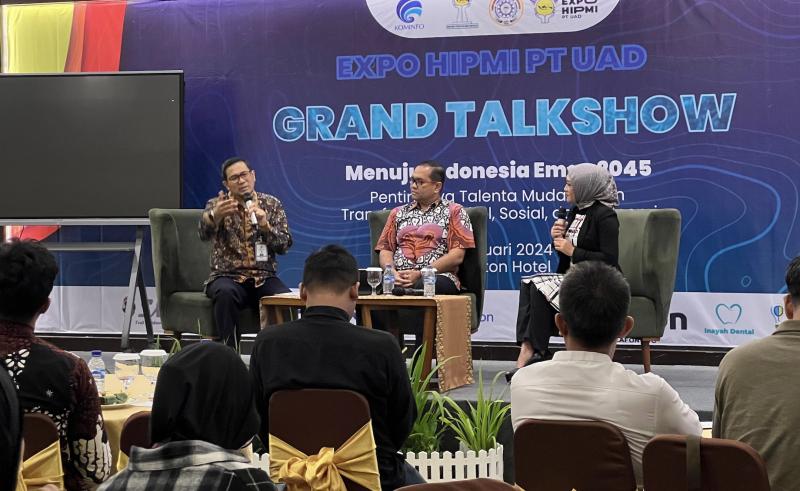
|
Getting your Trinity Audio player ready...
|

In the midst of the projected demographic bonus that Indonesia is expected to enjoy in 2030, Deputy Minister of Communication and Informatics Nezar Patria, represented by his expert staff in the field of Social, Economic, and Cultural Affairs, R Wijaya Kusumawardhana, highlighted the crucial role of the younger generation in shaping Indonesia’s future towards the Golden Era of 2045.
During the meeting held in Yogyakarta, he expressed that the current generation, aged between 15 and 30, is anticipated to play a pivotal role in realising the vision of Indonesia Emas 2045.
Wijaya emphasised that the younger generation is not only the largest user of social media in Indonesia but also a driving force behind the potential of the digital economy. Projections indicate that the digital economy’s contribution from this generation is expected to reach 20.7% of Indonesia’s Gross Domestic Product (GDP) by 2045.
The impact of the younger generation’s involvement in the digital economy is significant, with the potential to reduce poverty and contribute to the overall economic growth of the country. The government is also focusing on accelerating Indonesia’s digital economy by developing the digital skills of the younger generation, particularly Generation Z and Millennials.
The role of innovative young talent and digital literacy is seen as a prerequisite for realising Indonesia’s future as a leading economy in 2045, supported by the growth of micro, small, and medium enterprises (UMKM) and the startup community. Here are some roles they play:
- Promoting Digital Literacy: The Indonesian government needs to promote digital literacy among UMKM and startups to support initiatives such as HUB.ID and Sekolah Beta for development.
- Investing in Digital Infrastructure: The Indonesian government needs to invest in digital infrastructure to support digital economic growth, including improving internet connectivity and digital payment systems.
- Providing Access to Financing: UMKM and startups need access to financing to grow and expand their businesses. The Indonesian government has implemented programmes such as the National Economic Recovery Programme (PEN) and collaborated with financial institutions to provide them access to financing.
- Encouraging Innovation: The Indonesian government needs to encourage innovation and technological development, such as policies on digital financing and the use of artificial intelligence, which is expected to enhance productivity and income.
Responding to the need for human resources in the digital sector, Wijaya stated that Indonesia requires at least 9 million semi-skilled and skilled workers in the digital field between 2015 and 2030. However, he also emphasised the importance of productivity, considering that despite internet penetration reaching 78.19% of the total population or 215.63 million people, there is still a lack of productivity in the utilisation of the internet by the community.
Given the rapid development of digital technologies, such as cybersecurity, cloud computing, the Internet of Things (IoT), big data, and artificial intelligence (AI), Wijaya advocated for the mapping of the community’s conditions related to infrastructure, digital skills, and empowerment of digital technology. He highlighted that to meet these needs, the optimisation of AI technology is necessary to provide convenience in daily life. However, he also cautioned that understanding the limitations of AI utilisation is crucial for users.
The Ministry of Communication and Information Technology has facilitated various initiatives, including training programmes like the Digital Talent Scholarship (DTS) and Digital Leadership Academy (DLA). The DTS programme is divided into seven academies, catering to different aspects of digital skills. In contrast, the DLA programme aims to train 550 elite youth, including government officials and private sector leaders, in digital transformation.
These programmes aim to develop digital talent and leadership among the younger generation in Indonesia, aligning with the country’s efforts to become a leading economy by 2045. The government is committed to enhancing the digital skills of young people, especially Generation Z and Millennials, to support the growth of the digital economy and alleviate poverty.
In the context of collaboration, this meeting also involved various youth communities in Indonesia. Suwondo Nainggolan, the Chief of Police in Yogyakarta, participated as a speaker, demonstrating cross-sectoral support in facing the challenges and opportunities in this era of digital transformation.
















